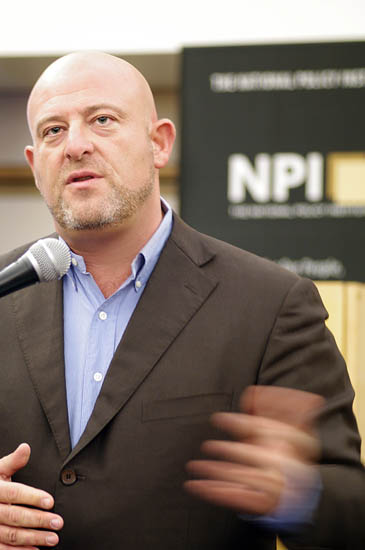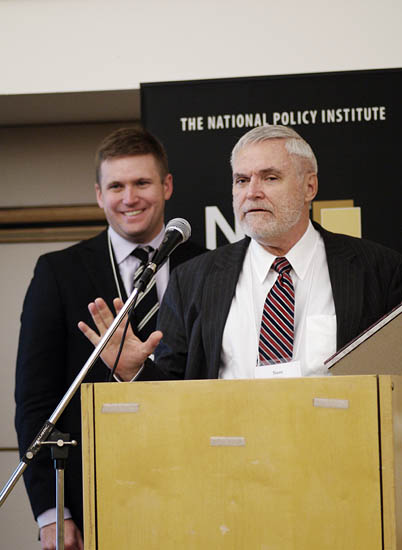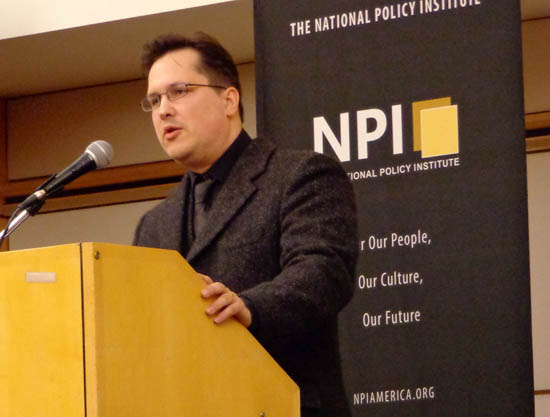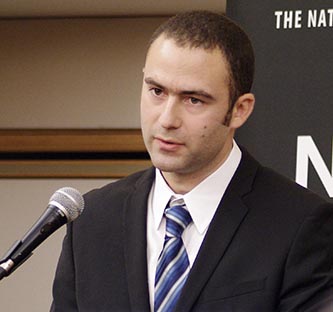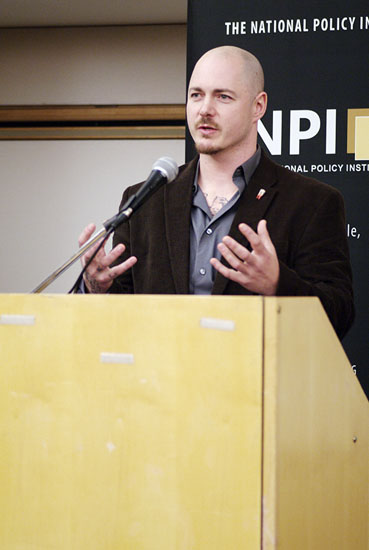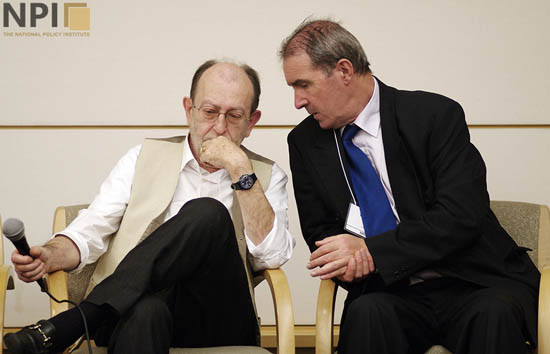After the Fall
AR Staff, American Renaissance, October 28, 2013
The National Policy Institute (NPI) held its second national conference in Washington, DC, on October 26, with a very interesting lineup of speakers. The meeting was held in the Ronald Reagan Center, a federally operated facility, which resisted all “anti-racist” threats to the conference.
The speakers were introduced by Richard Spencer, director of NPI, and the conference began with Piero San Giorgio, a Swiss author and survivalist. Mr. San Giorgio argued strongly that current population and consumption trends can lead only to economic and social collapse. We may have already reached “peak oil,” and in 15 or 20 years, the energy it takes to extract oil could be greater than the energy we can get from burning it. We are also running out of copper, zinc, bauxite, and other metals while we pollute, deforest, and overfish the planet.
Mr. San Giorgio predicted that what he calls “the religion of perpetual growth” will come to a crashing end as governments default on debt and nations go to war over resources. The result will be widespread poverty of a kind now found only in the worst parts of Africa.
Only organized groups will be available to survive this collapse, and the best organized groups for that purpose are criminal gangs, which are well armed and used to getting what they want by force. Those of us who do not want to be slaughtered by gangs will need what Mr. San Girogio calls a “sustainable autonomous base” with its own food supply, energy source, and armed defense. Mr. San Giorgio believes we should build such bases for ourselves but that no one will survive in isolation. We are social animals who need a tribe and social links. In the mean time, Mr. San Giorgio recommends getting out of debt, converting financial assets to gold, and learning how to lead the simpler, pre-industrial way of life that is coming.
Mr. San Giorgio elaborates on these themes in his book Survive–The Economic Collapse.
Sam Dickson spoke next on “America: the God that Failed.” Describing himself as a “racial communitarian,” he argued that America’s great failing has been an excess of individualism that has destroyed the organic ties of community. The British were already the most individualistic people of the Old World, and those who settled North America were the most individualistic of the British. Immigrants who followed, both through Ellis Island and later, have come to make money rather than to join a national community.
Americans glorify freedom and liberty, but the price has been so thorough a destruction of the racial and social bonds of community that we no longer live in a nation — those of us who imagine a better life are men without a country. And in some respects we are freer than our ancestors — we are free to fornicate, marry across racial lines, divorce, abort our children, and even marry a person of the same sex — but these freedoms are granted by the state. Without strong communities we are powerless in the face of the state that grants — and withholds — what it takes to be freedoms.
Mr. Dickson argued that any nation based on foolish propositions such as the equality of all men and the idea of inalienable rights — he noted that rights are alienated all the time — cannot even pretend to be a nation. He sounded a warning to Americans: We must recognize our susceptibility to “freedom” and rediscover the importance of community. We must build a “reracinated” nation that is a true outgrowth of Europe rather than the formless “biomass” that now constitutes what is called the American people.
Mr. Dickson was followed by a panel discussion on breaking the mainstream’s grip on media. It was composed of Andy Nowicki of AlternativeRight.com, John Morgan of Arktos Media, and Alex Kurtagic of the Wermod & Wermod Publishing Group. Mr. Nowicki described the current success of alternative media as “riding the crest of a wave” that makes it possible to spread dissident ideas to the entire world. He also noted the importance of supporting not only writers but artists who embody a new sensibility.
Mr. Morgan noted that although Arktos has been publishing only since 2010, it has produced some 60 books that he described as “alternatives to modernity.” Much of Arktos’ work has been to make available to English speakers important European works on politics, philosophy, and art that that have never been translated. Mr. Morgan noted that Arktos has been made possible only because of the latest technology — Internet, print on demand, Twitter, Facebook — and noted the delicious irony of fighting modernity with its own tools.
Mr. Kurtagic’s project is to produce beautiful, collectible versions of now-despised classics — what he calls “the dissident Penguin classics.” So far, he has produced beautiful annotated editions of Madison Grant’s best books and published a similar edition of Francis Yockey’s Imperium. At the same time, he strongly promotes new expressions of our traditional culture. To a questioner who doubted the wisdom of reviving bound books in the electronic age he replied that when the power goes out we will be glad to have paper.
Sam Dickson and William Regnery then spoke about how America has changed. Mr. Regnery, who grew up during the 1950s, said, “I regret that life in the ’50s is something my children, and grandchildren will not see.” He noted that there may have been precursors to the collapse in values of the 1960s, but that there was a community and even national coherence. He also described some of his adventures as a conservative activist but noted that the movement achieved virtually nothing in 40 years. “The conservative movement didn’t leave me,” he concluded. “I left the conservative movement.”
Mr. Dickson emphasized the same sense of community that he knew as a child, but also underscored how limited the sources of information then were. It was far harder than now to hear a dissident view of race or history, and a profusion of books, publishers, foundations, and Internet sites makes it much easier for independent-minded Americans to learn how badly their country has been led astray.
Mr. Kurtagic then spoke on “The End of the World as We Know It.” He noted that there is a vogue of fiction about the collapse of civilization. Many people sense that our levels of consumption and indebtedness cannot be sustained, but he pointed out that sometimes collapse can be slow and that its beginnings may be recognizable only in retrospect. Our aim should not be to contribute to the fall but to build what may come after the fall.
Today, egalitarianism is the highest value of the West but we must reject it. Egalitarianism makes everything the same, thus destroying all traditions and archetypes. Most people cannot even imagine a moral critique of egalitarianism, but until this false god is destroyed nothing new can emerge.
Egalitarianism erases the difference between the deserving and undeserving, and in so doing establishes a huge government apparatus that creates privilege for the undeserving. Egalitarian movements have also killed millions of people in their self-righteous quest for power. Conservatives try to fight egalitarianism with statistics and measures of inequality but theirs is only a half-hearted struggle that fails to reject the fundamental goal of homogenization and “social justice.”
Racialists seek to overthrow egalitarianism by asserting white identity but no solution can be found by seeking only what is good for whites. Western man believes in universal values, and will accept only those concepts based on what is good for all races. It is the left that makes a fetish out of race and we should not fall into its trap. We should strive towards the sublime, towards uniqueness, towards nobility. Biology is not a sufficient foundation for morality, and if we value our own uniqueness we must value and support the uniqueness of others.
Roman Bernard is a French activist who spoke about how young racially conscious Europeans are fighting dispossession. He said that for the first time, they feel deeply that all Europeans face the same challenges, and they see themselves as one people with a common destiny. They are not deceived by leftist media and, unlike European conservatives who just want to be left alone to enjoy their money, young identitarians want to take power so they can change the world.
Mr. Bernard pointed out that the old solution to immigration — white flight — is no longer possible. A man with a master’s degree waiting on tables cannot afford a house in the suburbs. As for solutions, it is too early to describe what form they will take. The awakening is too recent for its consequences to be predicted. However, the cultural and intellectual battle has begun, and more young people will join the movement as they see it as the only way out from a series of catastrophic failures.
So far, the most high-profile identitarian acts in France have been street theatre: storming the headquarters of the socialist party, and occupying the mosque that was under construction at Poitiers, not far from the famous battle of 732. The traditional Right would never think of doing such things. It is not possible to know how or whether these new youth movements will move into politics, but it has a focus and energy that reflect a genuine break with the past.
Jack Donovan, author of The Way of Men, spoke on “Becoming the New Barbarians.” Like Mr. San Giorgio, he predicted an inevitable decline and a more constrained way of life, since we can count on our rulers to fail us. They will also continue trying to keep us emasculated and dependent on the state. Healthy men are forceful, even violent. The state uses such men to serve its own violent purposes but wants to turn them into women for any other purpose.
Those among us who know that men are not created equal, who hate a government that tries to regulate everything, who know men and women are different, who believe free men should be armed, and who find same-sex marriage absurd are now the new barbarians.
Just as we are rejected and hated by the state, we must reject the state. Politicians cannot solve our problems, and once we recognize that they are crazy or stupid or both, we should “relax and appreciate their crafty strategies.” “We should see them for what they are,” Mr. Donovan added. “Be mocking, carefree, and violent.” We should not worry about changing the state; that is for people who believe in and belong to the state.
We must draw clear lines to distinguish ourselves from others, and be “morally accountable only to the tribe.” Blacks do not even pretend to care about us, and we must recognize that we have interests different from theirs. We have a compulsion to be fair, but this compulsion is healthy only in a world in which others believe in fairness.
When the decline comes, those with a tribal identity will survive, and a tribe must be of real comrades, not a group of Facebook friends. Bands of brothers should take over neighborhoods or apartment complexes. A community of 125 people can work together to survive when the state collapses, and if we have community we can live meaningful lives even if we are condemned to be outsiders in our own homeland.
The next speaker was Tomislav Sunic, the Croatian philosopher and author of Against Democracy and Equality. In a speech called “Beyond Nationalism, or the Problem of Europe,” he warned of the limits of white racial consciousness. Although he rejects the idea of inevitable progress — “after every sunny day there is a rainy day” — he does not believe in the inevitability of collapse. Even if there is a large-scale collapse, we cannot be sure that it will give rise to a healthy consciousness of race.
Mr. Sunic noted that the civil wars whites have waged against each other have killed far more of us than non-whites ever could. Race has never been a unifier; the Germanic Gepids even joined Atilla against Europe in the 5th century. At the same time, most of the people demonstrating in favor of illegal immigrants in Europe are themselves white, and “our worst detractors are from the same gene pool as ourselves.” He went on to point out that “when the final breakdown occurs, the lines of demarcation will not be clear at all,” and that there will be plenty of whites fighting on the barricades against us.
Mr. Sunic argued that Christianity is no longer central to the identity of the West. There are now more non-white than white Christians, and high-ranking church leaders tell us they see “the face of Jesus” among crowds of immigrants — even when they are Muslim or Hindu.
And yet biology alone cannot be our identity. “A generic white blank slate is meaningless if it is devoid of a racial soul.” Mr. Sunic called on whites to cherish their cultural and historical legacy because without that we are only a genotype. “We must resuscitate our sense of the tragic as well as our racial identity,” he concluded, noting that the sense of the tragic is what drives Promethean struggle, even in the face of overwhelming odds.
The keynote speaker was Alain de Benoist, the prominent French philosopher and one of the founders the New Right, who spoke about the nature of identity. He pointed out that as soon as someone speaks of his identity, it is a sign his identity is under attack. People in traditional, rooted societies do not ask “Who am I?” or “Who are we?” By the time someone begins to ask these questions, his identity may have disappeared.
Identity has many dimensions: language, culture, ethnicity, sex, profession, etc. We choose those parts of our identity we think most important to us, but it is a mistake to believe that our identity depends only on ourselves. A man living alone would have no identity, because identity is shaped by relations with others. Our community participates in our identity.
It is also a mistake to define identity as something immutable. We never cease to be ourselves, but the elements of which identity is composed change throughout our lives.
Many people say that mass immigration threatens collective identity, and this problem cannot be denied. However, too many natives then define themselves in opposition to what they are not rather than setting forth a positive identity.
Modernity itself attacks the identity of both the immigrant and the native. “I say the biggest threat is the system that kills the people,” Mr. de Benoist noted, adding that “the imposition of an across-the-board homogenization eliminates diversity of language culture, etc.” He decried global government and global markets that operate according to “the ideology of sameness.”
Mr. de Benoit also criticized capitalism because it seeks to reduce everything to a cost and a price, and to reduce all humans to interchangeable producers and consumers. Capitalism, noted Mr. de Benoist, has erased borders far more successfully than Communism ever did, and the global market leads to the global citizen. Capitalism has become a “total social fact” that seems to dominate and homogenize every aspect of our lives.
Modernity itself is the enemy of identity because it is rooted in the idea of progress, in which the past is nothing but a bundle of irrational superstitions. The future towards which modernity strives is one in which all men are individuals, seeking what is in their rational interests. Modernity has no place for the irrational or the collective, despite the fact that these are what give life meaning.
Mr. de Benoist concluded by saying that although globalization and Americanization are not synonymous, they are closely related. Only Americans believe that their system is the best in the world and that they have is a duty to export it. Of course, to the extent that this succeeds, it destroys all that is unique, different and valuable, just as it destroys identity. Ultimately, it destroys humanity because we cannot be human if we are all the same.
Before the conference speeches began, decorum was breached by an uninvited guest who shouted about “fu**ing racists” but the event was otherwise a success by any standard. Videos of the speeches should be available soon.

